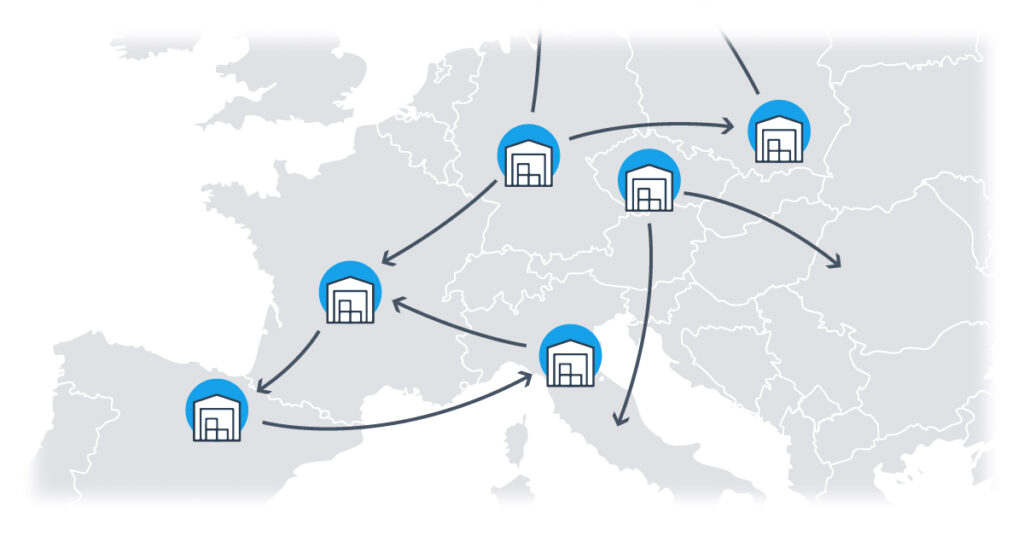- Do you sell products to Austrian customers?
- Do you store in Austrian warehouses?
- Do you ship products via an FBA program?

If one of these points applies, you may have to register for VAT in Austria and then start submitting regular VAT returns. The hellotax team can support you and assist you in fulfilling your VAT obligations.
Dominik Larcher
Last Updated on 4 May 2022When do I have to submit a VAT return in Austria?
1. When the EU-wide delivery threshold for distance selling is exceeded
- VAT returns are required in the countries in which distance sales are carried out if the net sales of the business exceed the EU-wide delivery threshold of € 10,000.
- If the distance selling threshold is exceeded, a VAT registration and a regular VAT return are due in all countries in which sales are made.
- However, if you take part in the OSS program and only sell in Austria, but not store, this rule does not apply (more information below).

2. When goods are stored in Austria
- As soon as goods are stored in Austria or another European country, the seller is liable for VAT.
- This regulation includes both independent storage by the seller and storage by a fulfillment program or by a fulfillment provider with warehouses in Austria.
- In all of these cases, VAT registration and the submission of VAT returns in Austria are mandatory.


Book a free consultation
Our VAT experts are happy to help you. Book a free consultation today!
3. When participating in a Fulfilled-by-Amazon (FBA) program
- This is the case, for example, with Amazon’s FBA programs, which have warehouses located in the Czech Republic, Germany and Austria.
- By participating in any of these programs, you are allowing Amazon to store goods and products in each of the warehouses in a variety of countries.
- This means that the retailer is liable for VAT in all of these countries and, among other things, has to acquire an Austrian VAT identification number through registration.
- An Austrian VAT return is also necessary to declare sales from warehouses in Austria to Austrian customers.

Do you store goods in Austria or do you exceed the EU-wide delivery threshold through distance sales to Austria?
In both cases, you have to register for VAT in Austria and also start submitting advance VAT returns. If you contact us, we can relieve you of all VAT-related tasks so that you can continue to concentrate on expanding your business in Austria.

Book a free consultation
Our VAT experts are happy to help you. Book a free consultation today!
How to file VAT Returns in Austria
VAT returns in Austria need to be filed electronically. If a business’s turnover per year lies between € 30,000 and € 100,000 VAT returns need to be filed quarterly. However if the turnover exceeds € 100,000 monthly returns have to be submitted. Any business whose sales fall under € 30,000 don’t need to charge VAT and are exempt from standard VAT returns.
As per usual, registration for VAT in Austria is required in order to be able to file austrian VAT returns. To register for VAT and to acquire an austrian VAT ID, an application including some other documents proving the business’s existence and VAT registration in the EU needs to be submitted to the Austrian tax office in Graz-Stadt. A fiscal representative is not necessary for EU entities.
The general VAT returns are usually due on the 15th of the second month following the tax period. In case of late filings or misdeclaration, the penalties consist of a 10% interest charge on the unpaid VAT. An additional 2% are charged upon delays in payment. In order to prevent penalties and fines, it is important to stay on top of VAT duties at all times.
You can simplify both VAT registration and the filing of VAT returns in Austria by using the hellotax VAT automation tool. We help you automate VAT payments, correspond with the authorities and make sure you stay VAT compliant!
The EU-wide delivery threshold and OSS
In July 2021, an EU-wide threshold of € 10,000 replaced the previous country-specific delivery thresholds for intra-European distance selling business. Instead of € 35,000, you now have to register for VAT and submit VAT returns in Austria if the net turnover in B2C distance selling to other European countries exceeds a flat rate of € 10,000. While the first € 10,000 is taxed at the VAT rate of the home country and the VAT is paid to the authorities there, each additional euro must be charged with the country-specific, e.g. Austrian, VAT rate and the tax must also be paid in the respective country of destination.
Participation in the One Stop Shop offers a simplification. After registering for the OSS, all sales must be taxed at the country-specific VAT rates, as the EU-wide delivery threshold can no longer be used. However, the entire sum can be declared and paid in the company’s home country. Different VAT registrations and VAT returns are therefore no longer necessary. Instead, the domestic tax office then distributes the money to the tax offices abroad. This applies as long as the goods are only sold and not stored abroad. As soon as goods are stored, separate VAT registration and VAT returns are required again.
Example: A German Amazon entrepreneur has annual net sales of € 11,000 through sales to France, Spain and Austria. If he makes use of the EU-wide delivery threshold, sales of € 1,000 must be taxed with country-specific VAT rates, such as the Austrian one, and registration and VAT returns are mandatory in every country, including Austria. If he uses the OSS program, sales of € 11,000 are taxed at foreign VAT rates, but the entire tax is paid in Germany and reported there in advance. However, if he participates in a fulfillment program in which his goods may be stored in Austria, VAT registration is required again in Austria. If goods from this Austrian warehouse are then sold to Austrian customers in the same country, these sales are declared in Austria as part of a VAT return.
Confused? Do not worry! hellotax can help you decide which option is best for you and support you with the VAT registration as well as registration for the one-stop-shop.

Hellotax One-Stop-Shop Solution
- Automated identification of B2C sales
- Automated determination of your tax rates
- Handling of OSS registrations and reports
- Quality control for your transactions
When do I need to file VAT Returns in Austria?
VAT Returns in Austria are generally due on the15th of the second month following the tax period using the U30 form. All returns are to be submitted electronically.
| Filing | How often? | Deadline? | Document? |
| VAT Return | Monthly or Quarterly | 15th of the second following month | U30 form in PDF or XML format |
| EC Listing | Monthly or Quarterly | Last working day of the following month | U13 form in PDF or XML format |
| Intrastat | Monthly | 10th of the following month | Intrastat Declaration |
| Yearly Return | Yearly | 30th of June | Form U1 in PDF format |
| 8th Directive | Yearly | 30th of June | In XML format |
Frequently Asked Questions
How often do I need to file VAT Returns in Austria?
Annual Returns are obligatory for all companies. Most businesses also need to file VAT Returns on a monthly basis. This is required if a business’s turnover per year exceeds € 100,000. Companies with sales ranging between € 30,000 and € 100,000 however only need to file Returns quarterly, while companies with less than € 30,000 in turnover are exempt from charging VAT.
What happens if I didn’t file VAT Returns?
The penalties for late filings equal an interest charged on unpaid VAT of 10%. An additional 2% are added for further delays. Professionals at hellotax can also help you register for VAT and file Returns retroactively.
How do I register for VAT in Austria?
In order to obtain a VAT ID and start filing VAT Returns in Austria you need to register for VAT by submitting an application including some documents proving the business’s existence and VAT registration in the EU to the Austrian tax office in Graz-Stadt.
What are the different VAT rates in Austria?
In Austria, the standard VAT rate on goods and services is 20%. A reduced rate of 13% applies to flights, cultural events, agricultural supplies and some other items, while 10% are added on foodstuff, water supplies, pharmaceuticals, transportation, newspapers and books, some plants and writing services. During the Coronavirus pandemic VAT rates were lowered and new rates applied on non-alcoholic beverages, hospitality and culture. However the rates were reverted again in December 2020.



